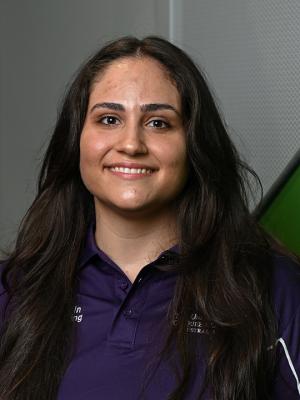Hi, I'm Sophie!
I'm in my Fourth Year of a Bachelor of Engineering (Electrical) / Bachelor of Commerce (Finance). I caught up with the Women in Engineering team to chat all things engineering and offer my advice to new engineering students.
What or who inspired you to choose engineering?
In school, I loved maths and science, but I was also drawn to creativity and design, so engineering felt like the perfect balance of both. My dad showed me the broad opportunities engineering had to offer, by taking me to his work and sharing stories about his experiences studying civil engineering at UQ. Although his job title did not include “civil engineer” he would tell me how without his qualifications he would not have gained the experience he needed to be successful in his profession. Engineering is ultimately a problem-solving degree and no matter where this degree takes me, I know that I will have gained beneficial experience I can apply to many different types of jobs.
Why did you choose the discipline you are studying?
When I started engineering, I had no idea what discipline I wanted to study. I chose electrical engineering after completing the first-year team project and realising my interest in coding and electrical systems. During the team project I was responsible for the power and control subsystem, and we faced the challenge of building and programming a robot, a project entirely new to me. I embraced the opportunity, immersing myself in research and navigating the trial-and-error process of implementing an electrical system. What I enjoyed most was testing different components, writing code and watching my creation come to life.
What is one thing about university or engineering that you wished you knew earlier?
Before I started studying engineering, I wish someone had told me how important it is to actively build connections and be outgoing in classes. Initially, I was so focused on my coursework that I didn’t realise the value of engaging with students in class and forming a strong network of peers. Having people to talk with about assignments and tutorial sheets and to study with is incredibly beneficial in engineering. Engineering is a field where collaboration and teamwork is encouraged. Being able to discuss ideas, compare approaches to solving problems, and work through tough concepts with others allows you to gain a deeper understanding of the topics. I found that simply having someone to ask, "How did you approach this problem?" or "Can you explain this concept to me?" alleviated the stress of feeling like I had to figure things out on my own. It’s also easier to stay motivated when you have a group of students who are working towards similar goals. Looking back, I realise how much more enjoyable and manageable my studies became when I connected with more students.
What made you pick engineering at the University of Queensland over other universities?
I chose to study engineering at UQ because of its strong reputation and industry connections. The university collaborates with leading companies, providing students with access to internships and networking events. Also, going into first-year engineering I was unsure of which specialisation I was going to choose, UQ’s Flexible First Year, allowed me to explore different engineering disciplines before committing to one in my second year of study.
Give us your best tip for first-year engineering students?
Ask questions, get involved and use the resources available. There are so many clubs and societies you can join and they’re a great way to meet new people. Having people around you to discuss assignments and talk through topics allows you to gain a deeper understanding of the topics and makes things less daunting if you are struggling to understand something. University can feel overwhelming at first, but attending lectures, tutorials and consultation hours will help. Make the most of the first-year learning centre and the tutors available.
Tell us your favourite example of amazing engineering?
One of the most amazing feats of engineering to me is the smartphone. It’s incredible how billions of people carry a powerful computer, communication device, camera and source of entertainment in their pocket. Smartphones show how technology has been engineered from a device that used to take up a whole room and now has evolved to be compact and efficient. The smartphone is a perfect example of how engineering transforms everyday life in ways we often take for granted.
What's your dream engineering job when you graduate?
Whilst I’m still unsure of my dream engineering job, that’s the beauty of an engineering degree, there are so many possibilities. The broad nature of electrical engineering excites me, and I’m using my subjects and internships to explore different industries and discover what I enjoy most. That said, last year I became involved with the Australian Power Institute and I am excited by the prospect of working in the power industry and even one day becoming a leader in ensuring Australia’s energy needs. Although I don’t have a dream job, I want to work for a company that aligns with my values, particularly in sustainable development and making a positive social impact. I thrive in collaborative environments and look forward to being part of a social and supportive team where individuals engage, share ideas, and bring enthusiasm to their work.
What do you hope to achieve as a WE student leader?
As a WE student leader, I hope to inspire, support, and empower more women to pursue engineering. I’m passionate about sharing my love for engineering and the vast opportunities it offers and by sharing my experiences I hope to encourage young women to pursue their goals with confidence.

